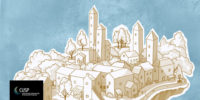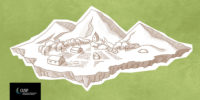In praise of the small & humble
This is the sixth blog in the ‘Collecting Real Utopias’ series, to seek out and celebrate ‘real utopias’, which use creativity, democratic processes, and/or alternative ownership models to challenge extractivist capitalism.. It is rooted in Malaika Cunningham’s research, which explores the overlaps between democracy, environmental justice, and participatory arts. To learn more about what is meant by ‘real utopias’ and the overall ambitions for this series, please have a look at her first blog. This article also appeared on the Arts Admin website.
BLOG by MALAIKA CUNNINGHAM
Today’s blog is in celebration of small, very locally focussed projects which I came across over two residencies I did last autumn. Two in Caithness (in the Highlands of Scotland), and one in Doncaster. It is also about these small & humble projects everywhere – you’ve probably noticed them from the bus, or maybe there is one near where you live. Despite their size, for those who are part of this work, they can help change our sense of what’s possible, and – in a very subtle, sometimes unintentional ways – challenge the supremacy of extractivist capitalism.
I will begin with the very smallest, the Thurso East Honesty Box. This tiny project is led by a woman called Amanda who has fallen in love with plants, foraging, and herbalism. Outside her house, she has set up a small honesty box housing seasonal wares – elderberry shrub, meadowsweet cordial, and rosehip syrup. She has designed labels for them. The box has a tendency to blow away in a strong gale. Locals pay-as-they-can to cover the costs of jars, non-foraged ingredients, a contribution to Amanda’s time. We went and picked up some chutneys and cordials from Amanda for a community meal we were hosting in Caithness and she spoke of discovering how much food and medicine could be found in the fields and woodlands around her house. You could hear the excitement in her voice at realising the hawthorn hedge just outside her door was both edible and medicinal. Her desire to share this excitement with her neighbours is why the honesty box exists. Many of the projects I’ve spoken of in this series deal with land justice or food justice and this tiny real utopia speaks to these themes. It reminds me of the custom of gifting within North American indigenous traditions, which I learned of in Braiding Sweetgrass by Robin Wall Kimmer. This custom invites us to acknowledge the gifts that nature offers us, and, if we accept these gifts, asks us to seek ways of passing these gifts on. The value of these gifts is enhanced by passing them on, building wider systems of reciprocity and generosity. This system of exchange sits in opposition to the paradigm of ownership and accumulation. As Wall Kimmer writes, “When all the world is a gift in motion, how wealthy we become.” I believe this is what Amanda’s honesty box contributes to. Whilst some money is involved in the process, I believe it still offers an opportunity to acknowledge and celebrate the gifts of the fields and woodlands of Caithness, and to pass those gifts on.
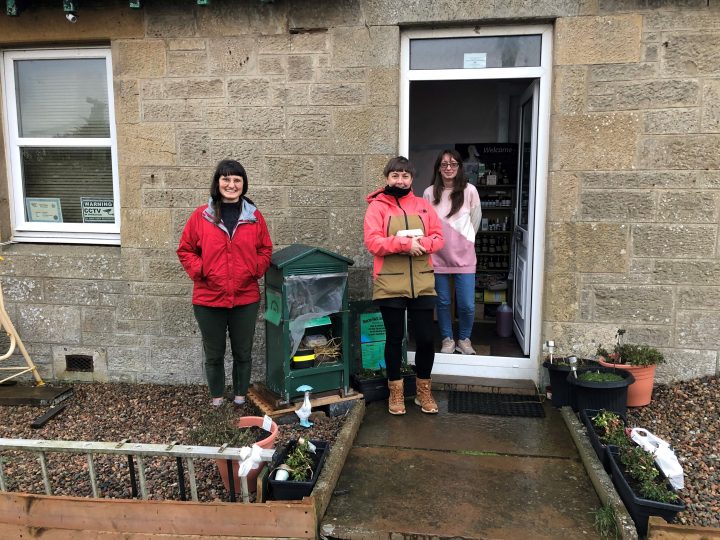
Another project we came across whilst in Caithness was the Dunnet Community Forest. This forest was originally planted by the Forestry Commission and looks it – dominated by fast growing spruce and pine. Since it was planted in the 1950s, a community of forest-lovers has formed around it. It has changed hands a few times, but in February 2021 it was bought by the local community – the Dunnet Forestry Trust. This trust had been managing the woodland for almost 20 years before they purchased it – planting broad leaf trees, managing paths, and building a sculpture trail and a log cabin for educational activities. We went and volunteered for a day to find out more and over a cup of tea asked why they felt they needed to own it, when their management of the space gave them most of the same powers. Those we spoke with said that it felt important both symbolically and practically. There is power in knowing that the ground is owned and managed by the local community who love and know it best – that there are no external powers (even as benign as Scottish Natural Heritage) who could interrupt the democratic processes of decision-making within the forest.
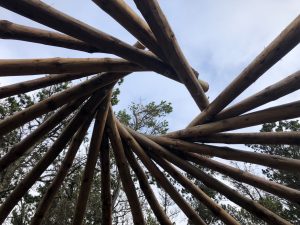
There have been a number of large community buy-outs of land in the Highlands and Islands (most famously the Ilse of Eigg) over the past 30 years: communities gathering together to take back the ownership and management of land from large estates with often absentee landlords. This offers a modern version of collective land ownership model reminiscent of a pre-Clearances era. Despite the move towards community buy-outs across the Highlands, the Dunnet Community Forest is the only community-owned land in Caithness. There is much more to say about community buy-outs, their historical significance, and why there may be a relative lack of this in Caithness (which is still largely owned by estates). For those interested in this topic, I direct you to the work of Magnus Davidson of the University of the Highlands & Islands – who has a rich personal and academic understanding of this field.
The final project I wanted to celebrate today is the Bentley Urban Farm in Doncaster. It exists on some council owned land, which was once a horticultural training centre.
(At this point I want to pause briefly to imagine the days when councils owned and ran things like a horticultural training centres…sigh).
Bentley Urban Farm is entirely volunteer run, mostly led by a very generous artist, farmer, and anarchist called Warren. Like many urban farms, they grow food for the community, they host artists and workshops, and lead educational projects about nature and growing. What I particularly love about Bentley Urban Farm is the slight air of chaos which comes from something being meaningfully collectively managed. There is a feeling that many hands have contributed to this space – that its vision has mostly been to say ‘yes’. Sometimes that ‘yes’ comes with a compost toilet made from old doors, sometimes it leads a raspberry patch. The areas and objects which make up Bentley Urban Farm do not match – but people don’t always match and this plurality is a crucial part of democracy. Creating a space which can host us all is going to be a messy affair.
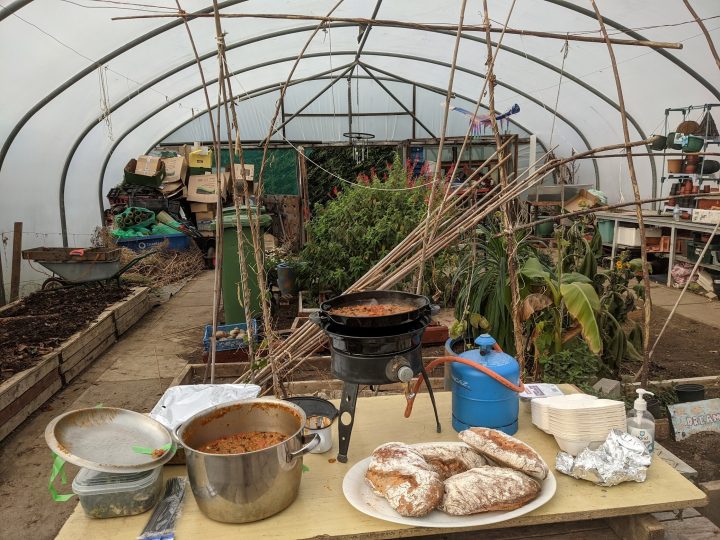
This sense of a mis-matching, but somehow broadly coherent space, is the spirit of democracy. And I also hope that it is the spirit of this blog series, and the whole philosophy of collecting real utopias. The projects spoken of in this series do not comprise an ordered and homogenous body of work. At times it may even be that some of the work sits in kinds of opposition to each other. For example, just above I mentioned the North American indigenous traditions of gifting, which is, in some ways, oppositional to community buy-outs – which is fundamentally about a system of ownership. Both can be ‘right’. Both can still be socially, environmentally useful. We can disagree, and both still be working towards something important and good. Firstly, disagreement is important – through it we improve our work. Finding ways of disagreeing with respect, care, and listening is a crucial part of democracy (Susan Bickford is a great author on this). Secondly, when it comes to real utopias, there is not one size which fits all. There are (and must be) many, many ways to challenge extractivist capitalism. Some of the most important work happens on a small, local scale – like the projects mentioned here. I believe that even with the mismatch, even with the potential disagreements, connecting this work together is an important task. Through this connection I hope we can find inspiration and solidarity – both of which are deeply important fuel for changing our current harmful systems and creating a better, liveable future.

